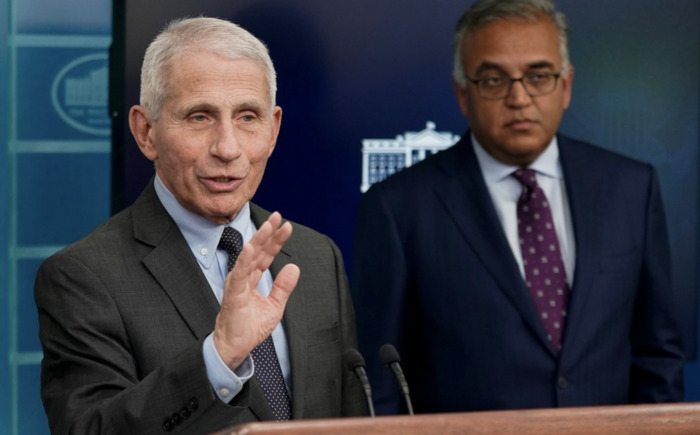
Mike Pence on Leadership and the Future of the Republican Party
Former US Vice President Mike Pence looks back on the events of January 6 2021, his final days in office with President Trump and his…
Thought Leader: Mike Pence

Dr. Anthony Fauci is back in the news as the media hype a resurgence of COVID-19 cases. Asked earlier last month by CNN’s Michael Smerconish if people should begin wearing masks again, he said, “I hope they would abide by the recommendation and take into account the risks to themselves and to their families. We are not talking about forcing anybody to do anything.” Fauci, of course, backed a national mask mandate in 2020.
But that’s the least of the COVID contradictions from Fauci and others. Put aside the obfuscations of the origin of the virus (smearing proponents of the Wuhan “lab-leak” as conspiracy theorists.) Our public health bureaucracy has made so many misleading and confusing pronouncements, and FGI has uncovered such inconvenient facts through FOIA requests, that the public should take any new dictates with a truckload of salt.
Prior to COVID, the only randomized control trial (RCT) of cloth mask efficacy was performed in the context of SARS virus. Considered to be the “gold standard” for drawing scientific conclusions, the RCT study found that cloth mask “filtration was extremely poor (almost 0%).” So, when COVID hit, the information with the highest integrity indicated cloth masks were virtually useless as a filter for airborne SARS virus. Perhaps Fauci was thinking of this study when he initially said there was no need for masks.
By October 2020, Fauci was a mask-believer, and working on a paper for the Journal of the American Medical Association (JAMA) that praised mask efficacy when The Federalist published an article that cited the findings of a CDC study completed the month before. Masks and face coverings, the CDC concluded, were ineffective in preventing the spread of COVID-19
The records obtained by FGI showed that Fauci was aware of both the article and the CDC study while working on his JAMA paper, as a co-author sent them to him the day the article was published. Fauci’s response: “Not good for our paper.”
In another email she stated, “I would not tell people that the cloth masks we are all wearing provide PERSONAL PROTECTION against acquisition of the virus-they may to some degree, but I have never seen convincing data on this.”
Shortly thereafter, Fauci’s JAMA paper was published without reference to the inconvenient studies, instead relying on an already discredited mask study. When another scientist pointed out the blunder, Fauci told his assistant to make a note of it but not to take any action to correct it.
It wasn’t just Fauci. Early in the pandemic, the CDC and the Infectious Diseases Society of America (IDSA) created the COVID-19 Real-Time Learning Network website purporting to share “accurate, timely information about COVID-19.” In November 2021, Dr. Michael Osterholm, director of the Center for Infectious Disease Research and Policy at the University of Minnesota, penned an official letter with several colleagues to the medical editor of the website, pointing out that both the site and the CDC’s guidance on masks currently contained incorrect, harmful advice for the American public.
Osterholm warned that the flawed information would “not only damage the credibility of science and endanger public trust by misrepresenting the evidence, but also provide false expectations in terms of respiratory protection to the public.” Officials should “reconsider [their] statements about the efficacy of masks and face coverings for preventing transmission of SARS-CoV-2.” Osterholm identified a pattern of cherry-picking studies based on their alignment with the administration’s policy agenda, saying, “Studies that do not support its perspective are similarly downplayed.”
Osterholm was ignored and CDC doubled down on claims that “any mask is better than no mask.”
Unfortunately, the dysfunction doesn’t end with masks. In November 2022, Vice President Kamala Harris tweeted, “One shot, once a year—that’s all most people will need to stay protected from COVID year-long.” The next day, HHS Secretary Becerra tweeted, “An updated COVID vaccine can help protect you from the worst outcomes of COVID. If it’s been over 2 months since your last dose, make a plan to get one now.” Becerra repeated his two-month recommendation the following day in another tweet.
Upon seeing the tweets, FGI made a FOIA request for documentation of the scientific reasoning supporting Becerra’s prescription for COVID-19 vaccine booster shots every two months. By law, the government is given 20 business days to respond to a FOIA, yet it took eight months and a lawsuit for the HHS to confirm that there was no medical evidence for six shots per year nor were there any documents or communications explaining the origin of the Secretary’s public health pronouncement.
We can hope COVID-19 as a public health issue and the government dysfunction that came with it will continue to fade into memory. Our public health bureaucracy didn’t exactly cover itself in glory while it was trying to cover our faces – and its posterior.
Mike Pence on Leadership and the Future of the Republican Party
Former US Vice President Mike Pence looks back on the events of January 6 2021, his final days in office with President Trump and his…
Thought Leader: Mike Pence
Marc Short on U.S. Investment in Critical Minerals
Why do critical minerals matter now? Marc Short explains how U.S. investment in critical minerals fits into a broader strategy around economic security, manufacturing, and…
Thought Leader: Marc Short
Marc Short on AI Policy and the Government’s Role in Chip Technology Investment
On CNBC, Marc Short breaks down the role of AI policy and how government investment is shaping the future of chip technology. A former Chief…
Thought Leader: Marc Short

